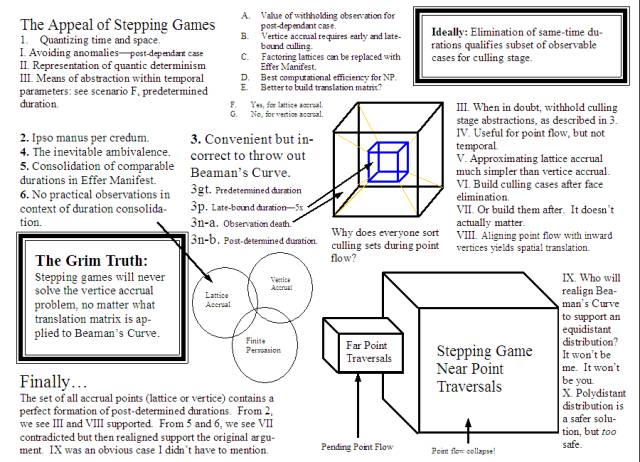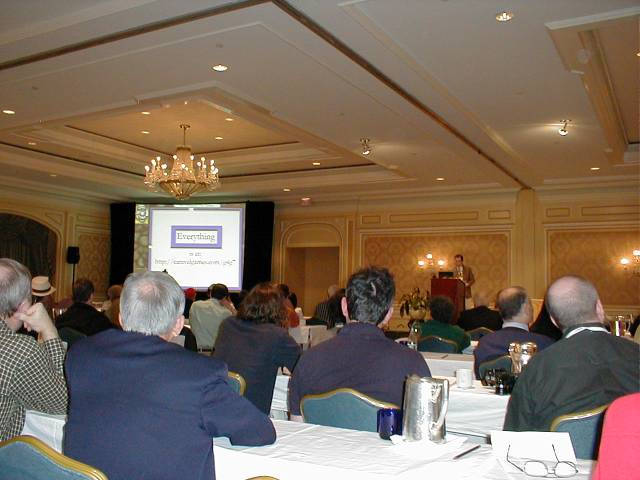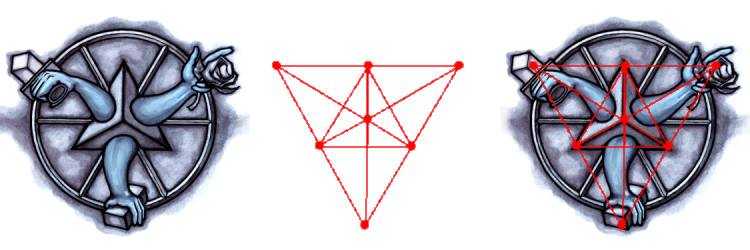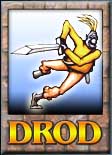My First DROD Speech
Ed Pegg Jr. suggested I attend this private conference called "Gathering for Gardner". At the time, I vaguely remembered somebody named "Martin Gardner". Didn't he write some stuff for Scientific American?
Yeah, he did. After a little research and reading, I realized that Gardner is an incredible guy fully worthy of having a conference held in his honor. But more importantly, since his writings cover a wide breadth of topics (math, science, puzzles, philosophy, biographical history, debunking, magicianry) the man's life interests work as a kind of party platform that people can use to structure a conference. If you liked a lot of what Gardner wrote about, and the scientific yet playful way he approached learning, then the Gathering would have something for you. The Man Himself wasn't present at the conference, (he doesn't like to travel) but he didn't need to be. Although some people spoke with admiration and respect for Gardner, it fell far short of cultish reverence. The conference was focused on ideas Gardner might have appreciated and not merely Gardner.
I resolved to make the trip to Atlanta. The conference landed right next to my wedding anniversary, but Brittany was happy to let the trip serve both purposes--fulfilling my nerdlust and our romantic comemoration. I didn't really know what I was getting into, since I'd never been to anything like this before. But whenever a unique experience is offered to me, I can't resist. A little bit later, Ed suggested that I give a speech on DROD at the conference. I had never spoken before more than 10 people before, so again, this was a unique experience that I couldn't resist. This weakness of mine will no doubt get me into trouble one of these days. Somebody will say, "Hey, you want to build the world's first underwater ferris wheel even though you know nothing about structural engineering?" Then my underwater ferris wheel will catch on fire and thousands will die because of my inability to simply say "no".
Well, nobody died as a result of my presentation. I think there were some yawns, sighs, and rolling eyes, but nothing catastrophic. The main problem I had, which I don't think I really surmounted, was that these 200 or so people in the room were fracking geniuses. I'm going to avoid name-dropping here, but the average attendee was somebody accomplished, semi-famous, and mentally formidable. And also, more importantly, these are people that are comfortable with a very quick intake of information. I knew this coming in, and actually made a little joke of it to start off my speech. I claimed to have condensed my entire presentation onto a single slide so as not to insult anyone's intelligence or waste their time. Then I brought up on the screen this little parody of what I thought people smarter than me might produce if they were overcaffeinated:

That got some laughs. Unfortunately, technical difficulties chopped about five minutes out of my speech, and I went a bit too slowly over the first half of it. I fear the whole thing came off a little as an infomercial for DROD, when I wanted it to convey some more general ideas for the great minds in the room. Here's a quick outline of what I talked about. People who read my last Illumination might recognize the similarities.
1. What is a stepping game?
2. Examples of stepping games:
2a. A game I made up that you can play on a chessboard.
2b. Robots--the earliest computer stepping game (probably).
2c. MESH by Everett Kaser
2d. Drain Storm by Dave Horner
2e. Wonderquest by Gustavo Duarte
3. DROD (my stepping game)
3a. Basics of movement
3b. Doors, orbs, arrows
3c. Roaches, eyes, serpents, brains
3d. Scripted characters
4. The Meat
4a. Large puzzle spaces are good. These are at odds with
constructing puzzles with elegant solutions, but they
make mere node-searching impractical.
4b. I don't like node-searching puzzles. Not fun for me.
I prefer...
4c. Lazy problem-solving.
4d. Show DROD room with example of lazy-problem solving in
it. Demonstrates how simple node-searching is worthless.
4e. Why moving elements in stepping games should be intuitive
and predictable.
5. Other kinds of stepping games that could be made.
5a. Non-grid spaces. For example, hex or non-quantized.
5b. Different shapes and sizes for controlled character.
5c. Adding other physical effects like acceleration, momentum,
inertia.
Painfully, I had to stop right after point 4c in my "The Meat" section above. And the meaty points I did manage to cover were rushed through as I became aware of my time running out. Oh well. Tom Rodgers had given me the advice earlier to "get to the meat" right away instead of building up to it, and I took that advice to a small extent, but not 100%.
Me giving the DROD talk. All my "slides" ran inside of DROD. I used the image floor to great effect.
I am very glad that my presentation was on the first day. It allowed me to enjoy the rest of the conference without my thoughts constantly returning to my upcoming performance. I went to some fascinating presentations. Here are some of the highlights:
Harold Jacobs - Martin Gardner in the Classroom
This guy had a great collection of images that look like one thing in one direction and after turning look like a completely different thing. One was a caricature of Garibaldi that changed to a caricature of Stalin with a 180 degree turn.
Martin Chlond - Integer programming in Recreational Mathematics
This talk, more than any other at the conference, made me regret my ignorance of math. Martin talked about how it was possible to solve a wide variety of puzzles by modelling the problem with equations. The part that required some ingenuity was creating those equations, but after that, solutions to very difficult problems were straightforward.
James W. Stephens - Monks, Kung Fu, and Fried Okra: Computer Assisted Puzzle Design
So James makes puzzle games that are like stepping games except for the independently-moving elements criterion. He has written some cool algorithms to both generate puzzles and decide how interesting the solutions are. He began with the idea that puzzles with longer solutions are more interesting to humans than those with short solutions. From there, he discovered some very boring long solutions to puzzles and added more culling criteria to refine the subset of puzzle candidates. He believes that many of his computer-generated puzzles would be difficult or impossible to distinguish from human-generated. So maybe his algorithm might pass a Turing test. I briefly pondered the idea of computer-generated DROD puzzles and then came to my senses.
John Conway - Seven Mathematical Wonders
Yes, it was that John Conway. The same guy that came up with the Game of Life, which for myself and many others, made clear the idea that a very complex system (like the universe we live in) can be constructed from very simple rules. I got my lazy butt out of bed a little too early to see what Conway had to say. A combination of mathematical ignorance and morning grogginess got in the way of my education. I think he was saying brilliant and entertaining stuff, but I don't know--you'd have to ask somebody else. I'm kinda dumb that way, you see. One thing I did learn was that Martin Gardner had a mechanical spider that jumped out of a desk drawer and startled John Conway.
Yossi Elran - Retrolife
Yossi hopped up on the podium after Conway for one of the brutally short 10-minute presentations. At this point, I had felt the pain of trying to fit my DROD talk into 30 minutes and how precious that time can be when you want to get your message across. So Yossi was up there ready to start talking, and John Conway had already run a bit long. Then John came back to the mic to append another anecdote to his speech, and I was kind of mad at him because Yossi had to stand up there and wait for his chance to continue and maybe lose time from his speech. Yossi's speech was actually about a type of puzzle that is based on Game of Life rules. Given a desired result of on-state squares on a grid that follows Life rules, what should the initial on-state squares be? It turned out Yossi had no difficulties with his speech. I talked to him later, and he actually considered it an honor to have his own speech delayed by ramblings from the life-game creator.
George W. Hart - Orderly Tangles Revisited
This guy makes some crazy-looking sculptures, many of which are based on the idea of tangled pieces. The structures he creates are too complex to practically ad-hoc together with physical materials. So he uses software to solve problems of how the pieces will be shaped, sized, and fit together. His tangled sculptures hold together without jigs, nails, glue, welding, or any other form of adherance other than how the expressed shapes restrain each other. I say expressed shapes to distinguish from jigs or other alterations to the shape made for construction and not expressive purposes.
Bob Friedhoffer - Performing Fleas - Were They Up to Scratch?
Some of us remember hearing about those old-time flea circuses. It sounds like such a ridiculous idea, so it makes you wonder what they really were. Could fleas actually be trained to do tricks? Bob gave a great little talk on performing fleas. The conclusion: there really were flea circuses involving fleas performing tricks. However, the fleas were just manipulated to do types of things they normally would without any kind of training. The best part for me was watching some old footage of a flea pulling an encyclopedia volume across a table. Yes, the flea actually did that. How do you think it was possible?
Ed Pegg Jr. - The Fano Plane
There is a certain kind of mental recreation that I had not really been exposed to before. You take a number, a shape, a certain arrangement of points, or something simple like that. Then you just enumerate all of the interesting properties of it. The theme of the conference was the number seven, and Ed chose to elaborate on the facets of a sevenish entity called a "Fano plane". I had this weird sense of familiarity with the figure Ed was describing, and I realized that the tattoo on my chest looks a fair amount like one. When I drew the art for that tattoo, I didn't know anything about Fano planes, so it's just an odd coincidence.

Mystical connection between my tattoo and the Fano plane is revealed.
I asked the hotel to wake me up at 8am Saturday morning, so I could go listen to Roger Penrose talk. Penrose is a famous guy who... oh, just look him up if you don't know. The hotel didn't wake me up, damn them. I stirred around 11am with that guilty I-slept-way-too-long feeling. So I missed Penrose, unfortunately.
Brittany and I had dinner with other attendees at Thomas and Sara Rodgers' beautiful house, and talked to many interesting people. I could pick just about anyone at random and be guaranteed an unusual conversation that took me off into the intellectual deep end. A few times, the conversations ended abruptly (but politely) as my knowledge didn't overlap enough with their specialties. A good line to start with is, "So what kind of stuff are you into?" Don't talk about the weather or sports or make too much small talk--that would be my advice for someone socializing with this crowd.
Our second night's dinner was quite a treat. We feasted in a banquet room at the Georgia Aquarium while being entertained by an opera singer, magicians, a juggler, and this incredible fellow that memorized information associated with zip codes. He would pick somebody from the audience and ask the zip code of where that person was from. Then without missing a beat, he would tell you what city it was, what his favorite restaurant was there, and maybe a few other factoids about the area. Extra-amazingly, people from England, Germany, and the Netherlands gave postal codes that he also successfully identified. After Brittany gave our zip code, our neighborhood was quickly identified with a precision that would make you think the man lived there himself.
I met a few DROD fans at the convention, and that was cool. I also met one nice guy who was severely enthusiastic about Hex-a-Hop. Man, he likes that game! I'd almost say he was evangelical about it.
I would definitely like to go again to the conference. It seems possible that some people here may also be interested, and it's an experience I recommend to them. I never got a straight answer on what the rules and motivations are for who can come or not. I suspect that the main criteria are: 1. You are really interested in the content of the conference. 2. You won't make an ass of yourself there, causing others to regret they came. If anyone has an interest, try Googling "Gathering for Gardner" towards the end of this year and look for contact information. Before you ask, I won't vouch for anyone, and I don't have any kind of status that would help that anyhow. If you really want to go, I think you'll get there with a small amount of persistence.
-Erik
